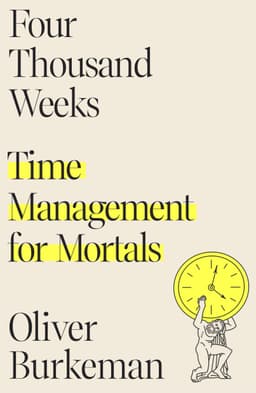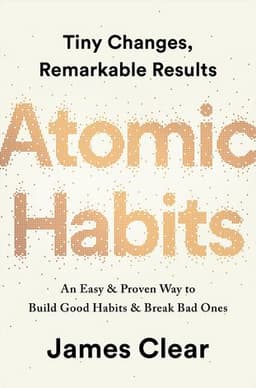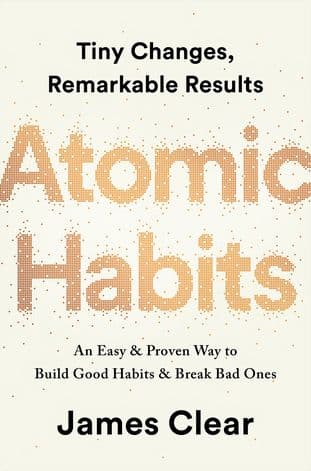
Four Thousand Weeks Book Summary
Time Management For Mortals
Book by Oliver Burkeman
Summary
"Four Thousand Weeks" offers a radical perspective on time management, urging us to abandon the futile quest for control and embrace our finite existence. By accepting our limitations and making conscious choices, we can discover a more meaningful and fulfilling way to spend our brief time on this planet.
Sign in to rate
Average Rating: 4
Choosing to Choose
Part 1 of "Four Thousand Weeks" challenges conventional time management wisdom, arguing that our obsession with productivity and efficiency is a futile battle against the reality of our finite existence. Instead, Burkeman proposes a "limit-embracing life" where we accept our constraints and make conscious choices about how to spend our limited time.
From Fluid Experience to Abstract Commodity
Before the invention of clocks, time was experienced as a fluid and expansive medium, deeply intertwined with the rhythms of daily life and nature. Medieval peasants, for instance, didn't experience "busyness" or "boredom" because their lives were structured around concrete tasks rather than abstract schedules. However, the Industrial Revolution and the rise of clock-time transformed our relationship with time. It became an external resource to be managed, measured, and maximized, leading to the anxieties and pressures we face today.
Section: 1, Chapter: 1
The Efficiency Trap: A Cycle of Futility
The efficiency trap describes the paradoxical cycle where our efforts to become more productive often lead to feeling busier and more overwhelmed.
Increased Efficiency: We adopt tools and techniques to get more done.
Rising Demands: Our capacity to do more leads to greater expectations and workload.
Feeling Overwhelmed: Increased demands result in feeling busier and more stressed.
Renewed Drive for Efficiency: The cycle begins again as we seek even more efficient solutions.
Section: 1, Chapter: 2
The Tyranny of Convenience: Losing the Meaningful
The pursuit of convenience, while seemingly helpful, can erode the meaning and value of our experiences. By eliminating "friction" in everyday tasks, we lose opportunities for connection, reflection, and appreciation. Here's how to resist the allure of convenience:
Be mindful of your choices: Choose the inconvenient option when it aligns with your values and fosters connection.
Embrace the "friction": Recognize that inconvenience can be an opportunity for mindfulness and appreciation.
Prioritize experiences over efficiency: Seek activities that offer depth and meaning, even if they require more effort.
Section: 1, Chapter: 2
The Allure of Convenience
“Convenience culture seduces us into imagining that we might find room for everything important by eliminating only life’s tedious tasks. But it’s a lie. You have to choose a few things, sacrifice everything else, and deal with the inevitable sense of loss that results.”
Section: 1, Chapter: 2
Existential Overwhelm: The Burden of Infinite Possibilities
The modern world presents us with an overwhelming array of options and experiences, leading to a sense of "existential overwhelm." This feeling arises from the gap between the limited time we have and the seemingly infinite possibilities available. Social media further exacerbates this by constantly exposing us to new desires and experiences.
Section: 1, Chapter: 2
We Are Time: Embracing Finitude
"Our limited time isn't just one among various things we have to cope with; rather, it's the thing that defines us, as humans, before we start coping with anything at all."
Section: 1, Chapter: 3
Heidegger and the Authentic Life
Heidegger's philosophy emphasizes the importance of confronting our finitude to live authentically. He argues that our existence is defined by our limited time, and we must acknowledge this reality to fully embrace life. He contrasts authentic living with "falling," where we distract ourselves and avoid taking ownership of our choices.
Section: 1, Chapter: 3
The Joy of Missing Out
Accepting our limitations allows us to experience the "joy of missing out." This means recognizing that every choice involves sacrifice, and it is this sacrifice that gives our decisions meaning. We can find fulfillment in embracing the present moment and the choices we make, rather than lamenting the countless possibilities we miss out on.
Section: 1, Chapter: 3
The Procrastination Equation: Choosing What to Neglect
We often view procrastination as a negative habit, but Burkeman suggests it's inevitable and can be a tool for prioritizing tasks. The key is to become a "good procrastinator" by:
Paying yourself first: Dedicate time to your most valued activities before tackling other demands.
Limiting work in progress: Focus on a small number of projects at a time to avoid feeling scattered and overwhelmed.
Resisting middling priorities: Avoid the trap of "good enough" options that distract from what truly matters.
Section: 1, Chapter: 4
Perfectionism and Procrastination
Procrastination can stem from perfectionism and the fear of failing to meet unrealistic expectations. We avoid starting projects because we anticipate falling short of our idealized vision. By accepting that our creations will always be imperfect, we can overcome this paralysis and begin taking action.
Section: 1, Chapter: 4
Kafka and the Fear of Commitment
The author Franz Kafka's tumultuous relationship with Felice Bauer exemplifies how the fear of commitment can be a form of procrastination. By keeping their relationship confined to letters, Kafka avoided the limitations and compromises of a real-world partnership. This allowed him to maintain the illusion of infinite possibilities while ultimately hindering his ability to experience genuine intimacy.
Section: 1, Chapter: 4
Settling: An Inevitable and Liberating Truth
The fear of "settling" in relationships and careers stems from the belief that we can find a perfect option if we search long enough. However, Burkeman argues that settling is unavoidable due to our finite time and the inherent limitations of reality. By embracing this truth, we can commit to our choices without the anxiety of missing out on some imagined ideal.
Section: 1, Chapter: 4
Attention: The Currency of Life
"Your experience of being alive consists of nothing other than the sum of everything to which you pay attention."
Section: 1, Chapter: 5
The Illusion of Indistractibility
While we often strive for complete control over our attention, it's essential to recognize that we are inherently distractible beings. Instead of seeking to become indistractible, we can manage our attention by:
Understanding the attention economy: Recognize how digital platforms exploit our attention for profit.
Making conscious choices: Be deliberate about what you choose to focus on.
Accepting limitations: Acknowledge that distractions are inevitable and develop strategies to minimize their impact.
Section: 1, Chapter: 5
The Attention Economy: A Machine for Misusing Your Life
The online "attention economy" thrives on capturing and monetizing our attention. Social media platforms and other digital technologies employ persuasive design techniques to keep us engaged, often at the expense of our well-being and ability to focus on what truly matters. This constant bombardment of information and stimuli distorts our perception of reality and influences how we allocate our time and energy.
Section: 1, Chapter: 5
The Intimate Interrupter: Our Internal Struggle
Our tendency towards distraction often arises from an internal urge to escape discomfort. When we focus on meaningful but challenging tasks, we confront our limitations and the anxiety of uncertainty. This discomfort leads us to seek distractions as a form of relief.
Section: 1, Chapter: 6
Discomfort and the Avoidance of Finitude
Understanding the root cause of distraction can empower us to manage it more effectively. We can:
Acknowledge the discomfort: Accept that facing our limitations and uncertainties is inherently uncomfortable.
Resist the urge to escape: Instead of seeking distractions, focus on the present moment and the task at hand.
Develop a tolerance for discomfort: Gradually increase your capacity to stay present with challenging experiences.
Section: 1, Chapter: 6
Beyond Control
Part 2 of "Four Thousand Weeks" goes deeper into the illusion of control we often seek over time. Burkeman explore the pitfalls of obsessive planning, the limitations of our "ownership" of time, and the importance of rediscovering genuine rest in a culture that prioritizes productivity. We then look into the power of patience, the benefits of synchronizing our time with others, and the pitfalls of excessive individual autonomy.
The Futility of Planning and the Unknowable Future
Our desire to plan and control the future stems from a need for security and certainty. However, the future is inherently unpredictable, and our attempts to control it often lead to increased anxiety. We can find greater peace of mind by:
Accepting uncertainty: Recognize that we cannot eliminate the unknown aspects of life.
Focusing on the present: Instead of dwelling on future possibilities, engage fully with the present moment.
Letting go of control: Release the need to dictate every outcome and embrace the unfolding of life.
Section: 1, Chapter: 7
We Are Time, Not Its Possessor
“We never have time in the same sense that we have the cash in our wallets or the shoes on our feet. When we claim that we have time, what we really mean is that we expect it."
Section: 2, Chapter: 7
Anxiety and the Demand for Reassurance
Worry and anxiety often arise from our desire for reassurance about the future. We seek guarantees that things will unfold according to our wishes, but this quest for certainty is ultimately futile. By recognizing that we cannot control or predict the future, we can free ourselves from the burden of worry and embrace the present moment.
Section: 2, Chapter: 7
The Past as a Guide to the Future
Reflecting on the past can provide perspective on our anxieties about the future. We often arrive at where we are in life through a series of unplanned events and coincidences. This realization can offer comfort and a sense of trust in our ability to navigate the unknown future.
Section: 2, Chapter: 7
Living in the Moment: The Antidote to Instrumentalization
Our tendency to instrumentalize time, viewing it solely as a means to an end, can lead to a sense of emptiness and dissatisfaction. We become so focused on future goals that we fail to appreciate the present moment. By shifting our perspective and recognizing the inherent value of each experience, we can find greater fulfillment in the here and now.
Section: 2, Chapter: 8
The Causal Catastrophe: Childhood's Intrinsic Value
The pressure to raise successful children often leads parents to view childhood solely as a means to an end. This "causal catastrophe" neglects the intrinsic value of childhood experiences. By prioritizing the present moment and allowing children to simply be children, we can foster a more joyful and meaningful childhood for both parents and kids.
Section: 2, Chapter: 8
The Last Time: Embracing the Transient Nature of Life
Recognizing the finite nature of life can enhance our appreciation for each experience. We can:
Treat every experience as potentially the last: Savor each moment with the awareness that it may never come again.
Resist the urge to rush: Allow experiences to unfold at their own pace and appreciate the unique qualities of each moment.
Focus on the present: Avoid dwelling on the past or future and engage fully with what is happening now.
Section: 2, Chapter: 8
Leisure and the Quest for Meaning
Our culture's emphasis on productivity has infiltrated our approach to leisure. We feel pressure to use our free time for self-improvement or future-oriented goals, turning relaxation into another form of work. By reclaiming leisure as an end in itself, we can experience genuine rest and enjoyment without the need for justification.
Section: 2, Chapter: 9
The Sabbath: A Radical Act of Rest
The concept of the Sabbath, a day dedicated to rest and rejuvenation, offers a powerful antidote to our culture's obsession with productivity. It provides a framework for stepping away from work and embracing a different pace of life. While societal pressures have made it more challenging to observe a traditional Sabbath, we can still create intentional periods of rest and disengage from the demands of work and achievement.
Section: 2, Chapter: 9
On Mortality
“mortality makes it impossible to ignore the absurdity of living solely for the future.”
Section: 2, Chapter: 9
The Impatience Spiral: A Counterproductive Cycle
Our modern culture's obsession with speed and efficiency fuels a cycle of impatience that ultimately hinders our well-being and productivity.
Rising Expectations: Technological advancements and societal pressures create expectations for faster results.
Increased Urgency: We feel compelled to rush and multitask to keep up with demands.
Growing Frustration: Our inability to control the pace of reality leads to anxiety and dissatisfaction.
Heightened Impatience: We become even more impatient, perpetuating the cycle.
Section: 2, Chapter: 10
Escaping the Impatience Spiral: The Power of Surrender
To break free from the impatience spiral, we must:
Accept limitations: Recognize that we cannot control the pace of everything.
Embrace patience: Cultivate the ability to tolerate delays and allow things to unfold naturally.
Focus on the present: Resist the urge to rush and appreciate the value of each moment.
Section: 2, Chapter: 10
Patience as a Source of Power
"In a world geared for hurry, the capacity to resist the urge to hurry—to allow things to take the time they take—is a way to gain purchase on the world, to do the work that counts, and to derive satisfaction from the doing itself, instead of deferring all your fulfillment to the future."
Section: 2, Chapter: 11
Jennifer Roberts and the Art of Slow Looking
Art historian Jennifer Roberts challenges her students to spend three uninterrupted hours looking at a single painting. This exercise in patience reveals the hidden depths and details that emerge when we slow down and resist the urge to rush through experiences. It demonstrates how patience can enhance our appreciation and understanding of art, and life in general.
Section: 2, Chapter: 11
Three Principles for Cultivating Patience
To harness the power of patience, we can:
1
Develop a taste for having problems: Recognize that problems are inevitable and provide opportunities for growth and learning.2
Embrace radical incrementalism: Focus on making small, consistent progress rather than seeking immediate results.3
Recognize that originality takes time: Accept that true creativity often emerges after a period of learning and imitation.Section: 2, Chapter: 11
Time as a Network Good: The Value of Synchronicity
While we often seek individual control over our time, Burkeman argues that time is a "network good," meaning its value increases when shared and synchronized with others. Collaborative activities like raising families, building communities, and engaging in political action require coordinated schedules and a willingness to relinquish some personal autonomy.
Section: 2, Chapter: 12
The Loneliness of the Digital Nomad
The "digital nomad" lifestyle, while seemingly offering ultimate freedom and flexibility, often leads to isolation and loneliness. By prioritizing individual time sovereignty, digital nomads sacrifice the social connections and shared experiences that contribute to a meaningful life.
Section: 2, Chapter: 12
The Social Regulation of Time: Finding Freedom in Community
Embracing communal rhythms: Participate in activities with shared schedules and traditions.
Prioritizing in-person connection: Seek out opportunities for face-to-face interaction and collaboration.
Letting go of control: Be willing to adapt your schedule to synchronize with others.
Section: 2, Chapter: 12
Questioning the Meaning of Life: A Catalyst for Change
Doubting the meaning and purpose of our lives can be a catalyst for positive change. It signifies a shift in perspective, where we recognize the need to find fulfillment in the present moment rather than waiting for some future ideal. This realization allows us to confront the fundamental question of how we want to spend our finite time and what truly matters to us.
Section: 2, Chapter: 13
The Great Pause: A Shift in Perspective
The COVID-19 pandemic, with its disruptions and lockdowns, forced a "Great Pause" upon society. This pause revealed the unsustainability of our pre-pandemic lifestyles and highlighted what truly mattered – connection, community, and care for one another. It offered a glimpse of possibility and a chance to re-evaluate our priorities and make different choices about how we use our time.
Section: 2, Chapter: 13
Cosmic Insignificance Therapy: Embracing Our Irrelevance
Recognizing our cosmic insignificance can be a source of liberation and perspective. By acknowledging our smallness in the grand scheme of things, we can:
Release the pressure of self-importance: Let go of the need to leave a lasting legacy or achieve extraordinary feats.
Find meaning in the ordinary: Appreciate the value of everyday activities and relationships.
Focus on the present moment: Embrace the limited time we have and make the most of it.
Section: 2, Chapter: 13
The Human Disease: The Struggle for Time Mastery
"The fantasy behind so many of our time-related troubles is…the dream of somehow one day getting the upper hand in our relationship with time…But unfortunately, it’s the alternative that’s true: the struggle is doomed to fail."
Section: 2, Chapter: 14
We Are Time: Accepting Our Vulnerability
Our quest for mastery over time is ultimately futile because we are time. We cannot control or escape the limitations of our finite existence. Accepting our vulnerability and the unpredictable nature of life allows us to let go of the struggle for control and find peace in the present moment.
Section: 2, Chapter: 14
Living Fully in the Face of Finitude
Embracing our limitations is not about giving up on meaningful pursuits but rather about approaching them with a realistic perspective. We can:
Let go of unrealistic expectations: Accept that we cannot do everything and make peace with tough choices.
Focus on what truly matters: Prioritize activities and relationships that bring us joy and fulfillment.
Embrace the present moment: Savor each experience and make the most of our finite time.
Section: 2, Chapter: 14
Related Content


Atomic Habits Book Summary
James Clear
Atomic Habits reveals the surprising power of small habits, demonstrating how tiny changes can compound into remarkable results over time. By focusing on systems over goals and building identity-based habits, you can create lasting change and unlock your full potential.
Atomic Habits reveals the surprising power of small habits, demonstrating how tiny changes can compound into remarkable results over time. By focusing on systems over goals and building identity-based habits, you can create lasting change and unlock your full potential.
Productivity
Personal Development
Psychology

